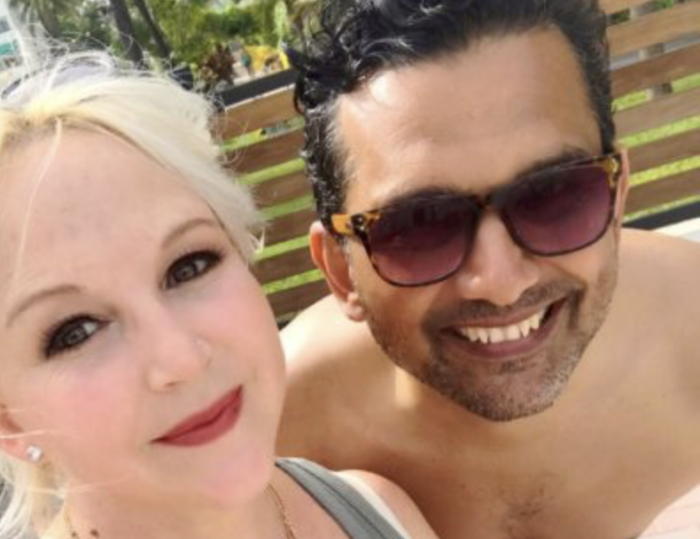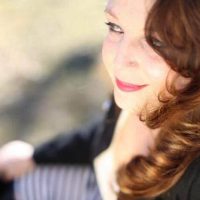I’m in Miami and swimming for the second time since March. I’ve felt like a fish out of water for months.
We all have, I realize. I’m in a small pool, but it’s empty. A Russian couple is arguing under a palm tree in a chaise lounge.
He looks like an intellectual: glasses, long stringy hair. His slender frame has aged, but his spirit is lively. She is a full set Babushka with a wet T-shirt, and I don’t know what has set her off, but she’s loud and annoyed at him.
I put my face in the water and transcend the noise. My mind wanders to my children, what they are doing, how they are feeling. I miss my cats. Lilly knows I go from time to time, but Lucky is confused.
When I swim, I can enter the center of their hearts and stay there a while. It’s a beautiful feeling. Time slows down, and the water takes on the texture of jello. It becomes thicker and suspends me as I push through the windy ripples, gently gliding in what I imagine Atlantis embodied.
I enter the hearts of others in this state—family members, friends, even those I love but don’t like. I feel their core. It’s peaceful.
My mind goes to the election for a minute, and I wonder why in the world I’m in Miami during this pivotal time in history. Sometimes the universe just guides you to a location with no explanation.
I realize the Russian lady doesn’t wear a bra. It’s hard not to notice. I like her—she’s the boss. Her husband scrunches over; I feel he wants a smoke. No smoking signs are everywhere, so he just looks at her. Nothing pisses off a woman more than a man who only looks while she yells. It must be a universal law.
The breaststroke is my favorite motion because the water can’t get into my Minnie Mouse ears. Actually, I like to stay in the gap just on the surface of the water. I’m not distracted by how to breathe as the droplets graze my lips, and my eyes remain closed.
My mind goes to the trips I took as a child from Iowa to Mexico or Santa Barbara or Sweden to visit my father.
Friends I met abroad assumed I had the privilege of a white American. While attending 10th grade in Cholula, Mexico, I realized the international community has many assumptions about the land of the free and home of the brave, and I had them too. Later, when I went to India, I realized the same assumptions were made there.
Everyone thought America was like Dallas.
I began to feel like the world looked at Americans like the cool parents—we presented it well, and we had what seemed like endless opportunities. Then as we begin to grow up, we realize the family divide, the gaps between the haves and have-nots, that our parents are just figuring it out, and that they may or may not be batsh*t crazy.
In any case, we realize we should all probably go to therapy and sort this out once and for all. Mom and Dad need help, and now for years, the international community is on to us.
They want to help, but they’re also horrified by “The Maury Show,” our current state.
The Russian lady storms off, her big feet splash on the sidewalk, and I giggle underwater. I keep going around in circles in calm waters. The Russian man pulls out his ukulele and sings a lullaby. The jello texture of water slips away to the translucent blue of an overcast sky. The sun peeks through as we continue to count.
My husband and I decided to go on a bike ride to the South Shore, along the boardwalk. It’s an exciting way to observe this part of the country’s multicultural vista, very masked-up and socially distanced, which I felt comforted by. Regardless of our views on masks, it has become synonymous with unspoken caring.
Even though I’m blonde and my husband is Indian, I’m amused that people here automatically speak to me in Spanish and to him in English. I don’t get that a lot in Iowa.
I was born in Peru, raised in America—my paternal grandparents were born in Bessarabia and moved to Peru. My mom was born and raised in Iowa, my husband’s father is Indian, and his mother is French.
We are “TCK”—third culture kids in America—in a land where we’re told anything is possible. I can imagine folks feeling the same way who climb Mt. Everest—just because it’s possible doesn’t mean it’s not damn hard.
Getting on our bikes was the equivalent of not watching the pot boil, and it worked! We let our minds wander to the distant views, the ocean with its rocky waves, and people of every nationality out on their morning walk. That zone you are in when you imagine the life and journey of each person you pass by and wonder what circumstances brought them to that moment in time when your paths cross.
It’s like that scene in “Amelie,” where she leads the blind man through the streets of Paris and explains the beauty of the world around him. That’s a rare and floaty feeling, and it happens without realizing it.
A group of sisters needed their group photo taken, and especially in these slow motion, do-gooder moments of divine intervention, I was happy to offer my services.
“You’re cute!” I yelled. “No, you!” Feminine love flowed.
I was so freaking hot after that windy bike ride. I was a shade of purple I didn’t know existed, and my butt hurt; I genuinely felt sorry for the skinny-assed people of the world in a sudden wave of compassion I had yet to experience. I jumped in the cold pool—there may have been a sizzle.
And then I got the text from my daughter—Biden won!
Joe Biden and Kamala Harris were going to lead our nation. Everything slowed down. The Russian man wasn’t playing the ukulele. I screamed, “Biden won!”
Everyone looked at me and smiled. It’s not over until the fat lady sings—and my friends—at that moment she sang, loud and clear.
Days like this are a rare feeling of overwhelming relief and joy, PTSD, and energy combined. But when Kamala Harris spoke last night, and she spoke with a smile on her face, and joy and sparkle in her eyes.
We not only felt the glass ceiling break for women and people of multicultural backgrounds but for the world that perhaps had a little faith restored in us again.
When President-elect Joe Biden spoke, he exuded the kindness and strength of a wise father who has experienced hardship and grief and wants to help us heal. It felt like Mom and Dad were home, and we could finally sleep.
We still have so much work to do—therapy on many levels must take place. But we’re back in calmer waters, and for this, I am extremely grateful.
~












Read 3 comments and reply